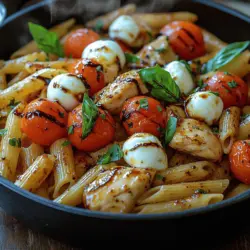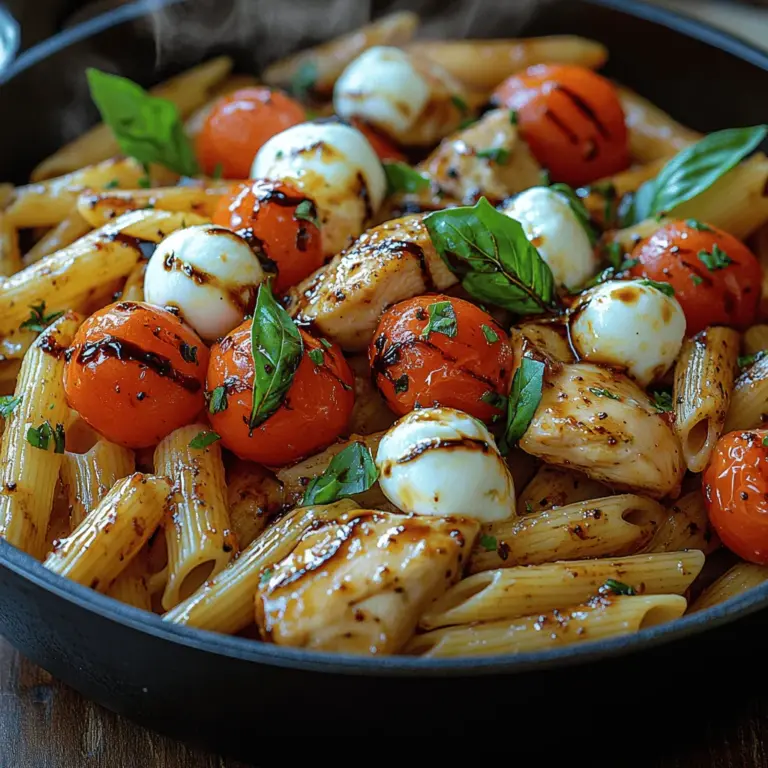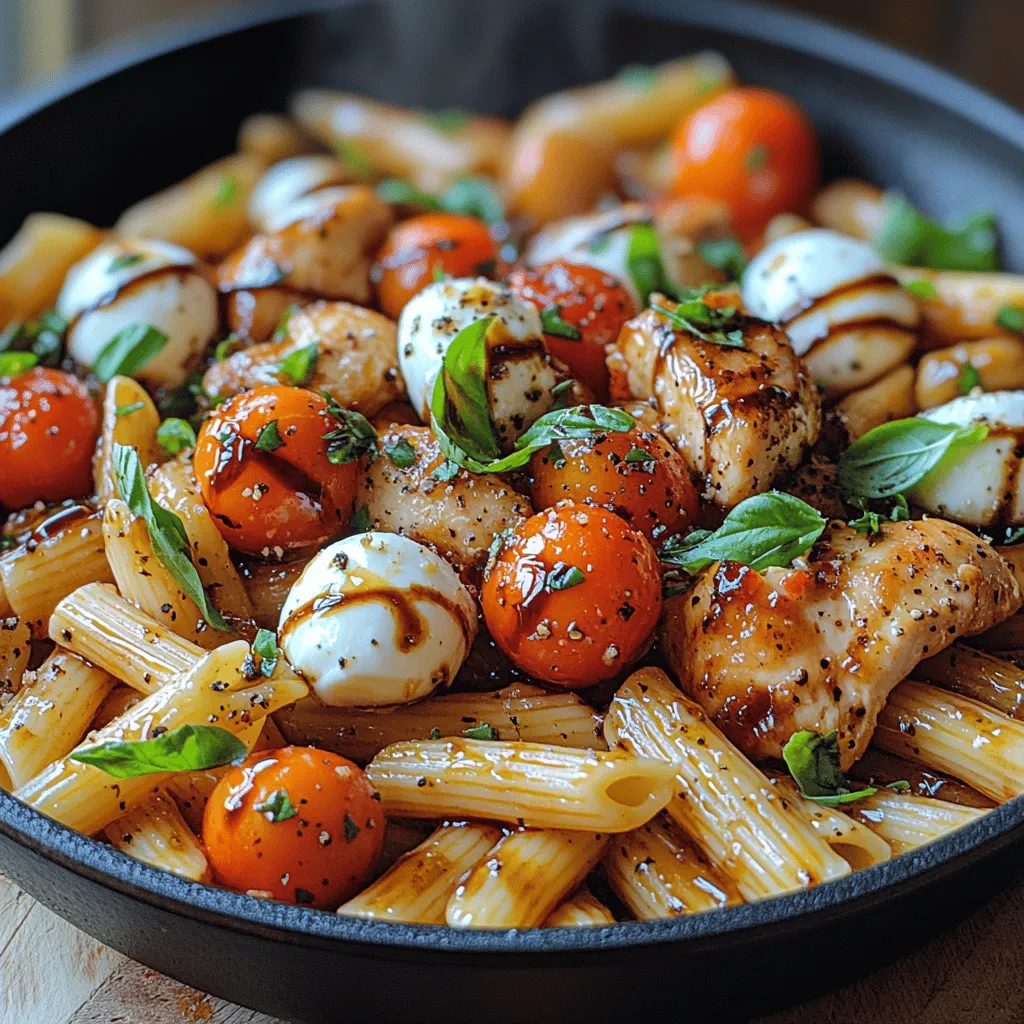When it comes to preparing a delightful weeknight meal that combines flavors, colors, and textures, the Caprese Chicken Pasta Skillet stands out as a perfect choice. This dish elegantly melds the classic Italian flavors of a Caprese salad with the heartiness of pasta and the protein-rich goodness of chicken, creating a meal that is not only satisfying but also simple to prepare. For busy families and food enthusiasts alike, this recipe offers a quick and delicious solution that can be whipped up in just one skillet, minimizing cleanup while maximizing flavor.
Understanding the Caprese Chicken Pasta Skillet
To truly appreciate the Caprese Chicken Pasta Skillet, it’s essential to understand the origins of its key elements. The Caprese salad, a staple of Italian cuisine, hails from the island of Capri. Traditionally made with fresh mozzarella, ripe tomatoes, and fragrant basil, this salad captures the essence of Italy’s culinary philosophy: simplicity and freshness. The vibrant colors of the ingredients represent the Italian flag, making it not only a feast for the palate but also for the eyes.
Translating the Caprese concept into a pasta dish introduces a new layer of flavor and texture. The addition of pasta makes this dish heartier, while the chicken provides a protein boost, transforming a light salad into a fulfilling meal. The balance of tangy tomatoes, creamy mozzarella, and aromatic basil is preserved, ensuring that each bite is reminiscent of the classic Caprese salad.
In addition to being delicious, the ingredients in this dish bring a wealth of nutritional benefits. Chicken is a great source of lean protein, essential for muscle repair and growth. Tomatoes are rich in vitamins C and K, and they contain lycopene, an antioxidant known for its health benefits. Fresh basil not only adds flavor but is also packed with vitamins A, K, and C, along with antioxidants. Finally, mozzarella cheese contributes calcium and protein while providing that beloved creamy texture. Together, these ingredients create a well-rounded meal that nourishes both body and soul.
Ingredients Breakdown
To achieve the perfect Caprese Chicken Pasta Skillet, you will need a selection of fresh ingredients that work harmoniously together. Here’s a closer look at each component and its role in the dish:
Chicken
The chicken serves as the protein base of the dish, providing substance and flavor. Boneless, skinless chicken breasts are commonly used, as they cook quickly and are easy to slice. For a twist, you could also use chicken thighs for a richer flavor or even substitute the chicken for plant-based proteins like tofu or chickpeas for a vegetarian option.
Pasta
The choice of pasta can significantly impact the overall experience of the dish. Short pasta varieties, such as penne or fusilli, are ideal as they hold onto the sauce and ingredients well. However, you could use spaghetti or any preferred pasta shape. Whole grain or gluten-free pasta can also be substituted to cater to dietary preferences.
Cherry Tomatoes
Fresh cherry tomatoes are a key ingredient that brings sweetness and acidity to the dish. They burst in your mouth, releasing their juices and creating a flavorful sauce that clings to the pasta. If cherry tomatoes aren’t available, you can use diced Roma or vine-ripened tomatoes, though the texture may differ slightly.
Fresh Basil
Basil is the aromatic herb that defines the Caprese flavor profile. Its sweet, peppery notes elevate the dish and provide a fresh contrast to the richness of the chicken and cheese. Always opt for fresh basil when possible, as dried basil lacks the vibrant flavor and aroma of its fresh counterpart.
Mozzarella Cheese
The creamy, mild flavor of mozzarella cheese is essential for achieving that classic Caprese taste. Fresh mozzarella, often sold in balls or logs, melts beautifully and adds a delightful creaminess. If fresh mozzarella isn’t available, you can use shredded mozzarella, but consider that it may not have the same texture.
Olive Oil
A drizzle of high-quality extra virgin olive oil enhances the flavors of the dish and adds richness. It’s also a staple in Italian cooking, contributing to the overall authenticity of the dish.
Garlic
Garlic infuses the dish with warmth and depth. Sautéing minced garlic until fragrant releases its essential oils and brings out its natural sweetness, setting the stage for the other ingredients.
Salt and Pepper
These fundamental seasonings are essential for enhancing the flavors of all the ingredients. Proper seasoning throughout the cooking process ensures that the dish is well-balanced and flavorful.
Variations and Substitutions
While the classic Caprese Chicken Pasta Skillet is delicious as is, there are numerous ways to customize it based on personal preferences or dietary restrictions. For instance, you could swap out the pasta for zoodles (zucchini noodles) for a low-carb option or use different proteins like shrimp or turkey. If you prefer a kick of heat, consider adding red pepper flakes or sautéing some chopped jalapeños along with the garlic.
For cheese lovers, experimenting with different cheeses like burrata or goat cheese can add unique flavors. If you’re looking to boost the nutritional profile, incorporating spinach or kale can add extra vitamins and minerals without compromising the overall taste.
Step-by-Step Cooking Instructions
Now that we’ve covered the ingredients, let’s dive into the step-by-step cooking process for making your Caprese Chicken Pasta Skillet. Each step is designed to maximize flavor and ensure that your meal comes together seamlessly.
Cooking the Pasta
Start by bringing a large pot of salted water to a rolling boil. The importance of cooking your pasta to an al dente texture cannot be overstated; this ensures that the pasta retains a slight firmness, which will help it hold up in the skillet with the other ingredients. Follow the package instructions for cooking time, typically around 8-10 minutes for most short pasta shapes.
Once the pasta is cooked to al dente, reserve about half a cup of the pasta water before draining. This starchy water can be added later to adjust the consistency of the sauce if needed. After draining, set the pasta aside and toss it with a splash of olive oil to prevent it from sticking together.
Preparing the Chicken
While the pasta is cooking, you can prepare the chicken. Begin by seasoning the boneless, skinless chicken breasts with salt and pepper. For added flavor, you can also use Italian seasoning or a blend of herbs like oregano and thyme.
Heat a tablespoon of olive oil in a large skillet over medium-high heat. Once the oil is shimmering, add the seasoned chicken breasts to the skillet. Cook the chicken for about 5-7 minutes on each side until golden brown and cooked through, reaching an internal temperature of 165°F (75°C). Remove the chicken from the skillet and let it rest for a few minutes before slicing it into bite-sized pieces.
Sautéing Garlic and Tomatoes
In the same skillet, add a bit more olive oil if necessary, along with minced garlic. Sauté the garlic for about 30 seconds, just until it becomes fragrant—be careful not to let it burn, as burnt garlic can impart a bitter flavor. Next, add the halved cherry tomatoes to the skillet. Cook them for about 5-7 minutes, stirring occasionally until they soften and start to burst. This will create a delicious sauce that will coat the pasta beautifully.
As the tomatoes cook, you may notice them releasing their juices, which will mingle with the garlic to form a light sauce. This step is crucial; it allows the flavors to develop and intensify, setting the stage for the remaining ingredients.
With the foundation of your dish set, you’ll be ready to combine everything in the next steps, turning your Caprese Chicken Pasta Skillet into a vibrant and flavorful meal that captures the essence of Italian cuisine.
Stay tuned for the continuation, where we will bring all the elements together to create a dish that is not only beautiful but also packed with flavor.
Combining Ingredients
Once your chicken is cooked through and your pasta is al dente, it’s time to bring the dish together. The key to combining your ingredients lies in gentle techniques that ensure you maintain the integrity of both the pasta and the fresh mozzarella.
Technique for Mixing: Start by adding the cooked pasta directly into the skillet with the chicken and tomatoes. Use a pair of tongs or a large spoon to gently toss the pasta with the chicken, allowing the flavors to blend without breaking apart the pasta. If you find that the mixture is too dry, add a splash of pasta cooking water; the starchy water will help create a cohesive sauce while keeping everything moist. Finally, fold in the mozzarella cubes, allowing the residual heat from the pasta and chicken to soften the cheese without melting it completely. This will ensure that you get delightful pockets of creamy mozzarella in every bite.
Drizzling Balsamic Glaze
A drizzle of balsamic glaze is the perfect finishing touch for your Caprese Chicken Pasta Skillet. This sweet and tangy condiment not only enhances the visual appeal of the dish but also elevates its flavor profile.
Adding Balsamic Glaze: To apply the glaze, simply hold the bottle above the skillet and create a zigzag pattern across the top of the pasta. The glaze will beautifully contrast with the vibrant colors of the tomatoes and basil, making the dish even more enticing. The acidity of the balsamic glaze cuts through the richness of the mozzarella and chicken, creating a balanced and harmonious flavor profile that excites the palate.
Flavor Profiles and Cooking Techniques
When creating the Caprese Chicken Pasta Skillet, you’re not just combining ingredients; you’re building a complex flavor profile that showcases the best of each component.
Flavor Analysis: The sweetness of the ripe cherry tomatoes plays beautifully against the creamy mozzarella, while the basil adds a fresh, herbaceous note that brightens the entire dish. The chicken provides a hearty base, contributing lean protein and a satisfying texture. The balsamic glaze introduces an acidic element, which balances the sweetness of the tomatoes and the creaminess of the cheese.
Cooking Techniques: Utilizing techniques such as sautéing and tossing ensures that each ingredient is cooked evenly and retains its natural flavor. Sautéing the chicken in olive oil not only creates a golden crust but also infuses the dish with a rich, savory base. The method of tossing the pasta gently with the other ingredients is crucial; this technique helps maintain the shape and texture of the pasta, ensuring that it doesn’t become mushy.
Balancing Flavors: To achieve the best flavor balance, consider the proportions of each ingredient. If you prefer a sweeter dish, opt for more cherry tomatoes. Conversely, if you’re looking for a sharper taste, increase the balsamic glaze. Taste as you go, adjusting the seasoning with salt and pepper to suit your preference. This interactive approach to cooking allows you to personalize the dish while ensuring that all flavors coexist harmoniously.
Serving Suggestions
Presenting your Caprese Chicken Pasta Skillet beautifully can enhance the dining experience, whether it’s a casual family dinner or a special occasion.
Plating Ideas: For an elegant touch, serve the pasta in shallow bowls, garnished with additional fresh basil leaves and a sprinkle of Parmesan cheese. A light drizzle of olive oil can also add a finishing touch. If you’re hosting, consider using a large serving platter, allowing guests to help themselves, which adds an inviting communal element to the meal.
Pairing Options: This dish pairs wonderfully with sides like garlic bread, which complements the Italian theme and allows for scooping up any residual sauce. A fresh green salad, dressed lightly with olive oil and lemon, can provide a crisp contrast to the richness of the pasta. For beverages, consider a chilled glass of white wine, such as Pinot Grigio or Sauvignon Blanc, which will enhance the meal’s flavors. If you prefer non-alcoholic options, sparkling water with a slice of lemon can be refreshing.
Seasonal Variations: The beauty of this recipe lies in its versatility. In the spring and summer, feel free to incorporate seasonal vegetables such as zucchini or bell peppers for added nutrition and color. In the fall, consider using butternut squash or pumpkin to add a unique twist. Adjusting the ingredients based on availability not only keeps the dish fresh but also allows you to experiment with flavors throughout the year.
Nutritional Information
Understanding the nutritional content of your meal can help you make informed choices, especially if you’re conscious about your diet.
Nutritional Breakdown: On average, a serving of Caprese Chicken Pasta Skillet contains approximately 450-550 calories, depending on the portion size and specific ingredients used. This includes around 30 grams of protein, 60 grams of carbohydrates, and 15-20 grams of fat.
Health Benefits: The ingredients in this dish contribute several health benefits. The chicken breast provides lean protein essential for muscle repair and growth. Fresh tomatoes are rich in vitamins A and C, antioxidants, and lycopene, which is known for its potential heart health benefits. Mozzarella cheese offers calcium, while basil is packed with anti-inflammatory properties.
Dietary Considerations: For those with dietary restrictions, there are simple adjustments you can make. Substitute traditional pasta with gluten-free varieties to create a gluten-free version of this dish. If you’re looking for a dairy-free option, consider using plant-based mozzarella or simply omitting cheese altogether while enhancing the flavors with more fresh herbs and spices.
Conclusion
The Caprese Chicken Pasta Skillet is a versatile dish that combines the best elements of Italian cuisine into a single, satisfying meal. Its vibrant flavors and easy preparation make it perfect for any occasion, whether you’re cooking for family on a weeknight or impressing guests at a gathering.
As you embark on your cooking journey, don’t hesitate to experiment with the recipe. Adjust ingredients, play with flavors, and make it your own. Cooking is not just about following a recipe; it’s about enjoying the process and sharing delicious meals with those you love. So, gather your ingredients, embrace your creativity, and enjoy the joy of preparing and serving this delightful dish.


